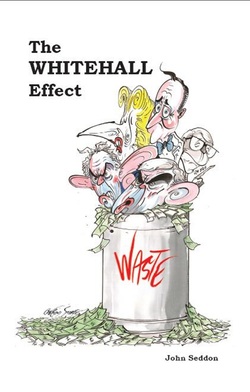The Whitehall Effect ~ John Seddon - Online Notes
|
Links below take you to the chapter notes:
Introduction 1. Prelude Part 1: The industrialisation of public services 2: Call centres 3. Back Offices 4. Shared Services 5. Outsourcing 6. Information Technology Part 2: Delivering services that work Introduction 7. A better philosophy 8. Effective change starts with ‘study’ 9. Better thinking, better design 10. ‘Locality’ working 11. IT as pull, not push Part 3: Things that make your head hurt 12. Targets and standards make performance worse 13. Inspection can’t improve performance 14. Regulation is a disease 15. It’s the system, not the people 16. Incentives always get you less Part 4: ideology, fashions and fads 17. Choice 18. Personal Budgets 19. Commissioning 20. Managing demand 21. Nudge 22. Procurement 23. Risk management 24. Lean 25. IT: features over benefits Part 5 Change must start in Whitehall 26. Beware economists bearing plausible ideas 27. Whitehall is incapable of doing evidence 28. Getting a focus on purpose |
16. Incentives always get you less
1] Stuart Sutherland, 2007, Irrationality, Pinter and Martin. Alfie Kohn, 1993, Punished by Rewards: the trouble with gold stars, incentive plans, A’s, Praise and other bribes, Houghton Mifflin. Edward L. Deci, Richard Koestner and Richard Ryan, 1999, ‘A meta-analytic review of experiments examining the effects of extrinsic rewards on intrinsic motivation’, Psychological Bulletin 1999 Nov; 125 (6):627-68; discussion 692-700. 2] See here for more on the subject of ‘payment by results’ and why it will always give you worse results. 3] The famous ‘Whitehall II’ study found that a major cause of stress at work was an imbalance between the psychological demands of work on the one hand and the degree of control over work on the other. People in jobs characterised by low control had higher rates of sickness absence, of mental illness, of heart disease and pain in the lower back. See Council of Civil Service Unions/Cabinet Office, 2004, Work stress and health: the Whitehall II study. View 4] Daniel Pink, 2009, Drive: The Surprising Truth About What Motivates Us, Riverhead Books. 5] Frederick Herzberg, 1987, ‘One More Time: how do you motivate employees?’ Harvard Business Review: Sept-Oct 1987 reprint with commentary of 1968 original (vol 46: no 1: pp.53-62). |

